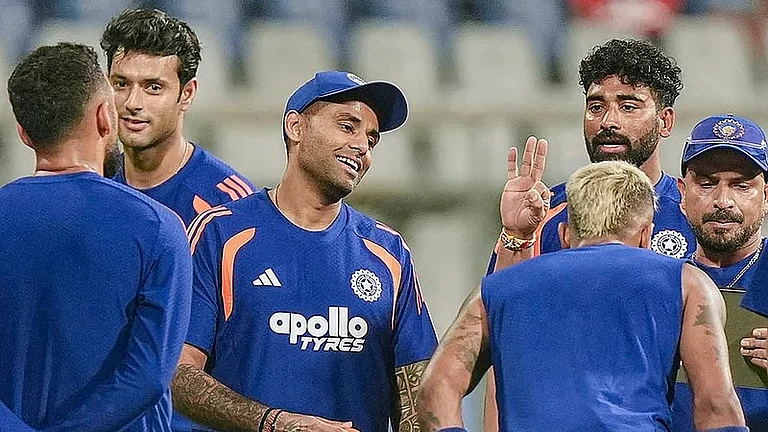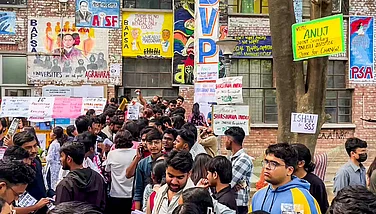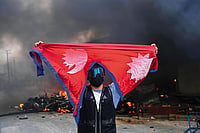After the National Council of Educational Research and Training (NCERT) amended history and social sciences textbooks to remove mentions of the 2002 Gujarat Riots and passages around the assassination of Mahatma Gandhi, academics, as well as Opposition politicians, came up in arms against the Narendra Modi-led government.
However, this is only the latest round of revision of textbooks published by NCERT under the Modi government and not even the most exhaustive one as over 20 per cent of the entire syllabus has been slashed since 2018.
The current round of revision has been described as a "quiet" revision as no formal statement or list of deletions was issued and changes were directly made it into the books going to the press.
Here we explore what has been revised —removed— in the current round, what earlier rounds of revisions did, and how has such revisions played out over the years.
No 2002 Gujarat Riots, no mention of RSS in Gandhi case
The latest round of NCERT revision has come under criticism for quietly removing references to the 2002 Gujarat Riots and passages on communal tensions around the time of Independence and Mahatma Gandhi's assassination.
From class 12th history textbooks, the background of Gandhi's assassin Nathuram Godse has been removed, the fact that the then-Union government cracked down on Rashtriya Swayamsevak Sangh (RSS) after Gandhi's assassination, and the fact that Gandhi stood for Hindu-Muslim unity and opposed Hindu majoritarianism after Independence have all been removed, reported The Indian Express, adding that these removals were "quiet" and were not specified in the 'rationalised' syllabus published last year.
Last year, the NCERT introduced major revisions in its textbooks. The reasoning was that the students' study load had to be reduced since they were emerging from the Covid-19 pandemic and had to catch up quickly with the studies. Though the last year's changes were themselves extensive —more on this later— the changes in the books now were not mentioned in that 'rationalised' syllabus.
Besides the passages on Gandhi and communalism, all mentions of 2002 Gujarat Riots have been removed from the NCERT books.
In 2002, a total of 1,044 people were killed in communal violence in Gujarat, comprising 790 Muslims and 254 Hindus, according to a report. Prime Minister Narendra Modi was the Chief Minister of Gujarat at the time and he and his government has been widely criticised for the Gujarat Riots along with Hindutva organisations like the Vishwa Hindu Parishad (VHP).
Citing the removal of a passage on communal ghettoisation, The Express reported, "With the removal of the above paragraph, all NCERT social science textbooks for classes 6 to 12 have been purged of all references to the Gujarat Riots. The Council has officially announced delition of references to the Gujarat Riots from the last chapter of the Class 12 political science textbook titled 'Politics in India Since Independence' and the Class 12 sociology textbook 'Indian Society' in its 'list of rationalised content' released in June last year."
Though these deletions have invoked a strong reaction from both the academic and political quarters, the previous rounds of changes were much more widespread and far-reaching.
No Islamic history, Mughal courts, Cold War
In the rationalised syllabus published last year, the NCERT removed several chapters, pages, and passages from all textbooks — not just social sciences. The stated reasoning was that students' study load had to be reduced in the wake of recovery from the Covid-19 pandemic.
Apart from key deletions in chapters on the Mughal administration and wars and history of Islamic rulers in India, there were also several other deletions that would appear to be strange. For example, in class 11 political science textbooks, chapters on US hegemony in world politics and the Cold War were removed.
Here are some of the major deletions made in social sciences textbooks last year:
In class 7 history textbook, Delhi Sultanate and the Mughals saw major deletions. While this falls in line with the ideological leanings of the establishment, two full chapters on architecture and socioeconomic make-up of the society at the time were also removed, titled ‘Rulers and Buildings’ and ‘Towns, Traders and Craftspersons’. In class 7 civics textbook, the entire chapter ‘Struggle for Equality’ was deleted.
In class 8 civics textbook, the entire chapter on the criminal justice system was removed. Some references to caste were also deleted in other chapters. In the history textbook, the chapter ‘Weavers, Iron Smelters and Factory Owners’ was removed.
In class 11 history textbook, chapters on Islamic history and Industrial Revolution were removed entirely. Moreover, the two chapters of ‘From the Beginning of Time’ and ‘Confrontation of Cultures’ were removed. In political theory textbook —11th has two books, one on Constitution and one on political theory — two chapters on ‘Peace’ and ‘Development’ have been removed.
In class 12th political science, two full chapters on the Cold War and US hegemony in world affairs were removed. In history, full chapters on the Mughal courts and culture, Partition, urbanisation and development of cities in the colonial period were removed.
While the stated reason is to “rationalise” the syllabus, trends in the removal of contents —related to the Islamic rulers, political theory related to development, Partition, and Gandhi assassination— have led to opposition that the removal is tilted towards shaping the national narrative as what students read shapes their mind firmly for their future lives.





















